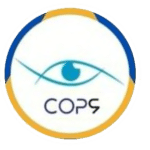You are expecting a baby, or your baby has just arrived in your life! In order to offer your baby an efficient ocular check-up, COP9, a Parisian multidisciplinary ophthalmology center run by Doctor Stéphanie Zwillinger, reveals everything about your baby’s vision from 0 to 24 months: its evolution, its pathologies, how to stimulate your baby through play, and especially the importance of having a diagnosis as soon as possible for your baby!

How does a baby’s vision change?
Your baby’s vision will evolve rapidly from 0 to 24 months. Little stimulated in the mother’s womb, your baby nevertheless perceives lights and shadows. It will be necessary to wait for the birth so that your baby’s perception of colors develops, and your baby will be able to see all the colors from around 5 months old.
If your baby is premature, the growth of the blood vessels in the retina will not be completely finished. Risks of retinopathy may occur: we propose a treatment if this pathology does not resolve itself.
Your newborn will only be able to see at a very short distance at first, which will gradually increase during the first 12 months. The visual field of a baby is initially restricted. It will gradually widen from around a year old to approach that of an adult. From 6 months of age, your baby will be able to get a prescription for glasses from your optical center.
During the first few weeks, the eye’s cones continue to evolve, allowing the child to see bright lights better.
Before your baby is 2 months old, they will be working on their focus, or the so-called accommodation phenomenon, and may appear to be crossing their eyes: their eyes are learning to work together, and you will accompany them in this visual development.
How to stimulate your baby’s vision?
In order to stimulate your baby’s visual field, we invite you to set up games: a moment of interaction but also of visual acuity development!
To exercise the baby’s eye muscles, hang a mobile above the crib. Then, make the baby follow a toy with their eyes to ensure that they develop stereoscopic vision (which allows them to see in relief).
Try to encourage your baby to grasp a toy in order to develop psychomotor skills: your baby will make the connection between what the eye perceives and the gesture of their hand. Choose toys with contrasting colors and shapes: vision is the last sense to develop in babies. Stimulate your baby’s vision by playing with them, and let them discover your face and your expressions!
Our entire team of practitioners reminds you that it is recommended to avoid exposing your baby from 0 to 24 months to screens (smartphone, computer, etc.): blue light is harmful for their eye health.
If you notice any abnormalities during these games, such as difficulty following with their eyes, cross-eyedness, or eyelids closing, contact our COP9 Vision Center for an appointment.
The importance of pediatric ophthalmological check-ups
As mentioned in our article on strabismus in children, we remind you that children’s eyes should be examined by a pediatric ophthalmologist from birth. The examinations carried out by this specialist will help determine the first signs of congenital eye disease or disorders such as myopia.
The examinations performed by the ophthalmologist will identify the first signs of any ocular problems. During the first 12 months of life, we recommend that you screen your baby or have a more complete check-up to detect any signs of eye disease.
The ophthalmologist will perform more in-depth eye exams on newborns who are “at risk. These are premature babies, or babies whose family has hereditary diseases, such as visual degeneration. A check-up should be done as soon as possible in order to prevent any risk of ocular pathologies for the baby.
Dr. Stephanie Zwillinger devotes most of her practice to pediatric ophthalmology: COP9 welcomes you and your baby from 0 to 24 months for a complete check-up.
Equipped with complete ophthalmic equipment, toys to make the examination fun for your child, take advantage of the benevolence and professionalism of the orthoptist and psychomotor team, don’t hesitate to make an appointment in order to have your little one’s vision monitored efficiently and effectively!
